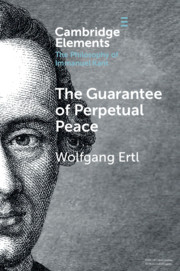Element contents
The Guarantee of Perpetual Peace
Published online by Cambridge University Press: 04 March 2020
Summary
Keywords
- Type
- Element
- Information
- Online ISBN: 9781108529785Publisher: Cambridge University PressPrint publication: 26 March 2020
Bibliography
- 2
- Cited by

